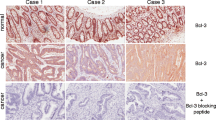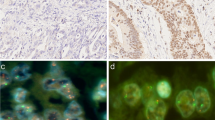Abstract
In order to clarify the association betweenbcl-2 protein (Bcl-2) expression and genetic alteration, we investigatedp53 andDCC (deleted in the colon carcinoma gene locus) gene abnormalities in Bcl-2-positive and-negative gastric carcinomas using a polymerase chain reaction/loss of heterozygosity (LOH) assay. Bcl-2 immunoreactivity was found in 25 of 178 (14%) gastric carcinoma cases. With these 25 positive cases, the proportion 18/87 (20.6%) of the total in early stages demonstrating invasion of the mucosa and/or submucosa was significantly greater (P=0.013) than the 7/91 (7.7%) found for advanced tumors exhibiting invasion into or through the muscularis propria. However, there was no statistically significant variation between the proportions for differentiated (17/98 cases, 17.3%) and undifferentiated (8/80 cases, 10%) lesions. Sixteen Bcl-2-positive cases (9 cases were not studied because of insufficient specimen material to allow extraction of DNA) and 31 cases randomly selected from a Bcl-2-negative group were analyzed for the presence ofp53-LOH or DCC-LOH and forp53 by immunohistochemistry. The minority of the Bcl-2-positive group hadp53-LOH and were immunopositive for p53 (P=0.033,P=0.028 respectively), while no association was found in the Bcl-2-negative category. In contrast, there was no correlation at all between Bcl-2 expression and DCC-LOH although the number of informative cases analyzed was too small to allow definite conclusions. These results indicate that Bcl-2 may be predominantly expressed at an early stage in gastric carcinomas, possibly in negative association withp53 gene abnormalities.
Similar content being viewed by others
Abbreviations
- DCC :
-
deleted in colon carcinoma gene locus
- LOH :
-
loss of heterozygosity
- PCR :
-
polymerase chain reaction
- VNTR :
-
variable number of tandem repeats
References
Baas IO, Muldder J-WR, Offerhaus JA, Vogelstein B, Hamilton SR (1994) An evaluation of six antibodies for immunohistochemistry of mutant p53 gene product in archival colorectal neoplasms. J Pathol 172:5–12
Bronner MP, Culin C, Reed JC, Furth EE (1995) The bcl-2 proto-oncogene and the gastrointestinal epithelial tumor progression model. Am J Pathol 146:20–26
Calle-Martin O de la, Fabregat V, Romero M, Soler J, Vives J, Yague J (1990)Acc II polymorphism of the p53 gene. Nucleic Acids Res 18:4963
Fearon ER, Vogelstein B (1990) A genetic model for colorectal tumorigenesis. Cell 61:759–767
Fearon ER, Cho KR, Nigro JM, Kern SE, Simons JW, Ruppert JM, Hamilton SR, Preisinger AC, Thomas G, Kinzler KW, Vogelaltered B (1990) Identification of a chromosome 18q gene that is altered in colorectal cancers. Science 247:48–56
Goelz SE, Hamilton SR, Vogelstein B (1985) Purification of DNA from formaldehyde fixed and paraffin embedded human tissue. Biochem Biophys Res Commun 130:118–126
Gorczyca W, Markiewski M, Kram A, Tuziak T, Domagala W (1995) Immunohistochemical analysis of bcl-2 and p53 expression in breast carcinomas: their correlation with Ki-67 growth fraction. Virchows Arch 426:229–233
Hahn M, Serth J, Fislage R, Wolfes H Allhoff E, Jonas U, Pingoud A (1993) Polymerase chain reaction detection of a highly polymorphic VNTR segment in intron 1 of the human p53 gene. Clin Chem 39:549–550
Halder S, Negrini M, Monne M, Sabbioni S, Croce CM (1994) Down-regulation of bcl-2 by p53 in breast cancer cells. Cancer Res 54:2095–2097
Huang Y, Boynton RF, Blount PL, Silverstein RJ, Yin J, Tong Y, McDaniel TK, Newkirk C, Resau JH, Sridhara R, Reid BJ Meltzer SJ (1992) Loss of heterozygosity involves multiple tumor suppressor genes in human esophageal cancers. Cancer Res 52:6525–6530
Joensuu H, Pylkkanen L, Toikkanen S (1994) Bcl-2 protein expression and long-term survival in breast cancer. Am J Pathol 145:1191–1198
Jones MH Nakamura Y (1992) Detection of loss of heterozygosity at the human TP53 locus using a dinucleotide repeat polymorphism. Genes Chromosomes Cancer 5:89–90
Kim CJ, Kim WH, Kim CW, Lee JB, Lee CK, Kim YI (1995) Detection of 17p loss in gastric carcinoma using polymerase chain reaction. Lab Invest 72:232–236
Korsmeyer SJ (1992) Bcl-2 initiates a new category of oncogenes: regulation of cell death. Blood 80:879–886
Lauwers GY, Scott GV, Karpeh MS (1995) Immunohistochemical evaluation ofbcl-2 protein expression in gastric adenocarcinomas. Cancer 75:2209–2213
Maesawa C, Tamura G, Suzuki Y, Ogasawara S, Sakata K, Kashiwaba M, Satodate R (1995) The sequential accumulation of genetic alterations characteristic of the colorectal adenoma-carcinoma sequence does not occur between gastric adenoma and adenocarcinoma. J Pathol 176:249–258
Matozaki M, Sakamoto C, Matsuda K, Suzuki T, Konda Y, Nakano O, Wada K, Uchida T, Nishisaki H, Nagao M, Kasuga M (1992) Missense mutations and a deletion of the p53 gene in human gastric cancer. Biochem Biophys Res Commun 182:215–223
McDonnell TJ, Troncoso P, Brisbay SM, Logothetis C, Chung LWK, Hsieh J-T, Tu S-M, Campbell ML (1992) Expression of the protooncogenebcl-2 in the prostate and its association with emergence of androgen-independent prostate cancer. Cancer Res 52:6940–6944
Miyashita T, Harigai M, Hanada M, Reed JC (1994) Identification of a p53-dependent negative response element in thebcl-2 gene. Cancer Res 54:3131–3135
Pezzella F, Turley H, Kuzu I, tungekar MF, Dunnill MS, Pierce CB, Harris A, Gatter KC, Mason DY (1993) Bcl-2 protein in non-small-cell lung carcinoma. N Engl J Med 329:690–694
Pilotti S, Collini P, Rilke F, Cattoretti G, Bo RD, Pierotti MA (1994) Bcl-2 protein expression in carcinomas originating from the follicular epithelium of the thyroid gland. J Pathol 172:337–342
Renault B, Broek M van den, Fodde R, Wijnen J, Pellegata NS, Amadori D, Khan PM, Ranzani GN (1993) Base transitions are the most frequent genetic changes at p53 in gastric cancer. Cancer Res 53:2614–2617
Saegusa M, Takano Y, Hashimura M, Shoji Y, Okayasu I (1995a) A possible role for Bcl-2 expression in progression of tumor of the uterine cervix. Cancer 76:2297–2303
Saegusa M, Takano Y, Okayasu I (1995b) Bcl-2 expression and its association with cell kinetics in human gastric carcinomas and intestinal metaplasia. J Cancer Res Clin Oncol 121:357–363
Saegusa M, Takano Y, Wakabayashi T, Okayasu I (1995c) Apoptosis in gastric carcinomas and its association with cell proliferation and differentiation. Jpn J Cancer Res 86:743–748
Seruca R, David L, Holm R, Nesland JM, Fangan BM, Castedo S, Sobrinho-Simoes M, Borresen A-L (1992) p53 mutations in gastric carcinomas. Br J Cancer 65:708–710
Sinicrope FA, Ruan SB, Cleary KR, Stephens C, Lee JJ, Levin B (1995)bcl-2 and p53 oncoprotein expression during colorectal tumorigenesis. Cancer Res 55:237–241
Stemmermann G, Heffelfinger SC, Noffsinger A, Hui YZ, Miller MA, Fenoglio-Preiser CM (1994) The molecular biology of esophageal and gastric cancer and their precursors: oncogenes, tumor suppressor genes, and growth factors. Hum Pathol 25:968–981
Sugano H, Nakamura K, Kato Y (1982) Pathological studies of human gastric cancer. Acta Pathol Jpn 32:329–347
Tahara E (1993) Molecular mechanism of stomach carcinogenesis. J Cancer Res Clin Oncol 119:265–272
Tsujimoto Y, Finger LR, Yunis J, Nowell PC, Croce CM (1984) Cloning of the chromosome breakpoint of neoplastic B cells with the t(14;18) chromosome translocation. Science 226:1097–1099
Uchino S, Tsuda H, Noguchi M, Yokota J, Terada M, Saito T, Kobayashi M, Sugimura T, Hirohashi S (1992) Frequent loss of heterozygosity at the DCC locus in gastric cancer. Cancer Res 52:3099–3102
Vogelstein B, Fearon ER, Hamilton SR, Kern SE, Preisinger AC, Leppert M, Nakamura Y, White R, Smits, AMM, Bos JL (1988) Genetic alterations during colorectal-tumor development. N Engl J Med 319:525–532
Author information
Authors and Affiliations
Rights and permissions
About this article
Cite this article
Saegusa, M., Takano, Y., Kamata, Y. et al. Bcl-2 expression and allelic loss of thep53 gene in gastric carcinomas. J Cancer Res Clin Oncol 122, 427–432 (1996). https://doi.org/10.1007/BF01212883
Received:
Accepted:
Issue Date:
DOI: https://doi.org/10.1007/BF01212883




